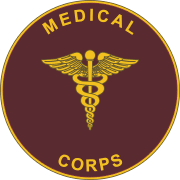United States Army Medical Corps
United States Army Medical Corps[edit | edit source]
The United States Army Medical Corps (USAMC) is a branch of the United States Army that provides medical services to soldiers and their families. Established in 1908, the Medical Corps is responsible for the medical readiness of the Army and the health care of its personnel.
History[edit | edit source]
The origins of the United States Army Medical Corps can be traced back to the American Revolutionary War, when the Continental Congress established a "Hospital Department" in 1775. However, it was not until 1908 that the Medical Corps was formally established as a permanent branch of the Army.
During World War I, the Medical Corps expanded significantly to meet the demands of the war. The Corps played a crucial role in providing medical care to soldiers on the front lines and in hospitals.
In World War II, the Medical Corps was instrumental in advancing medical practices, including the development of blood transfusion techniques and the use of penicillin.
Structure and Function[edit | edit source]
The Medical Corps is composed of commissioned medical officers who are physicians. These officers are responsible for the medical care of soldiers and their families, as well as the medical readiness of the Army.
The Corps is part of the Army Medical Department (AMEDD), which also includes the Army Nurse Corps, Army Dental Corps, and other medical branches.
Training and Education[edit | edit source]
Medical officers in the Army Medical Corps receive their medical education from civilian medical schools. After completing their education, they undergo additional military training to prepare them for service in the Army.
The Medical Corps also offers opportunities for further education and specialization in various medical fields.
Contributions to Medicine[edit | edit source]
The United States Army Medical Corps has made significant contributions to the field of medicine, particularly in the areas of trauma care and infectious disease management. The Corps has been at the forefront of medical research and innovation, often in collaboration with civilian medical institutions.
Related Pages[edit | edit source]
References[edit | edit source]
External Links[edit | edit source]
Search WikiMD
Ad.Tired of being Overweight? Try W8MD's NYC physician weight loss.
Semaglutide (Ozempic / Wegovy and Tirzepatide (Mounjaro / Zepbound) available. Call 718 946 5500.
Advertise on WikiMD
|
WikiMD's Wellness Encyclopedia |
| Let Food Be Thy Medicine Medicine Thy Food - Hippocrates |
Translate this page: - East Asian
中文,
日本,
한국어,
South Asian
हिन्दी,
தமிழ்,
తెలుగు,
Urdu,
ಕನ್ನಡ,
Southeast Asian
Indonesian,
Vietnamese,
Thai,
မြန်မာဘာသာ,
বাংলা
European
español,
Deutsch,
français,
Greek,
português do Brasil,
polski,
română,
русский,
Nederlands,
norsk,
svenska,
suomi,
Italian
Middle Eastern & African
عربى,
Turkish,
Persian,
Hebrew,
Afrikaans,
isiZulu,
Kiswahili,
Other
Bulgarian,
Hungarian,
Czech,
Swedish,
മലയാളം,
मराठी,
ਪੰਜਾਬੀ,
ગુજરાતી,
Portuguese,
Ukrainian
Medical Disclaimer: WikiMD is not a substitute for professional medical advice. The information on WikiMD is provided as an information resource only, may be incorrect, outdated or misleading, and is not to be used or relied on for any diagnostic or treatment purposes. Please consult your health care provider before making any healthcare decisions or for guidance about a specific medical condition. WikiMD expressly disclaims responsibility, and shall have no liability, for any damages, loss, injury, or liability whatsoever suffered as a result of your reliance on the information contained in this site. By visiting this site you agree to the foregoing terms and conditions, which may from time to time be changed or supplemented by WikiMD. If you do not agree to the foregoing terms and conditions, you should not enter or use this site. See full disclaimer.
Credits:Most images are courtesy of Wikimedia commons, and templates, categories Wikipedia, licensed under CC BY SA or similar.
Contributors: Prab R. Tumpati, MD







